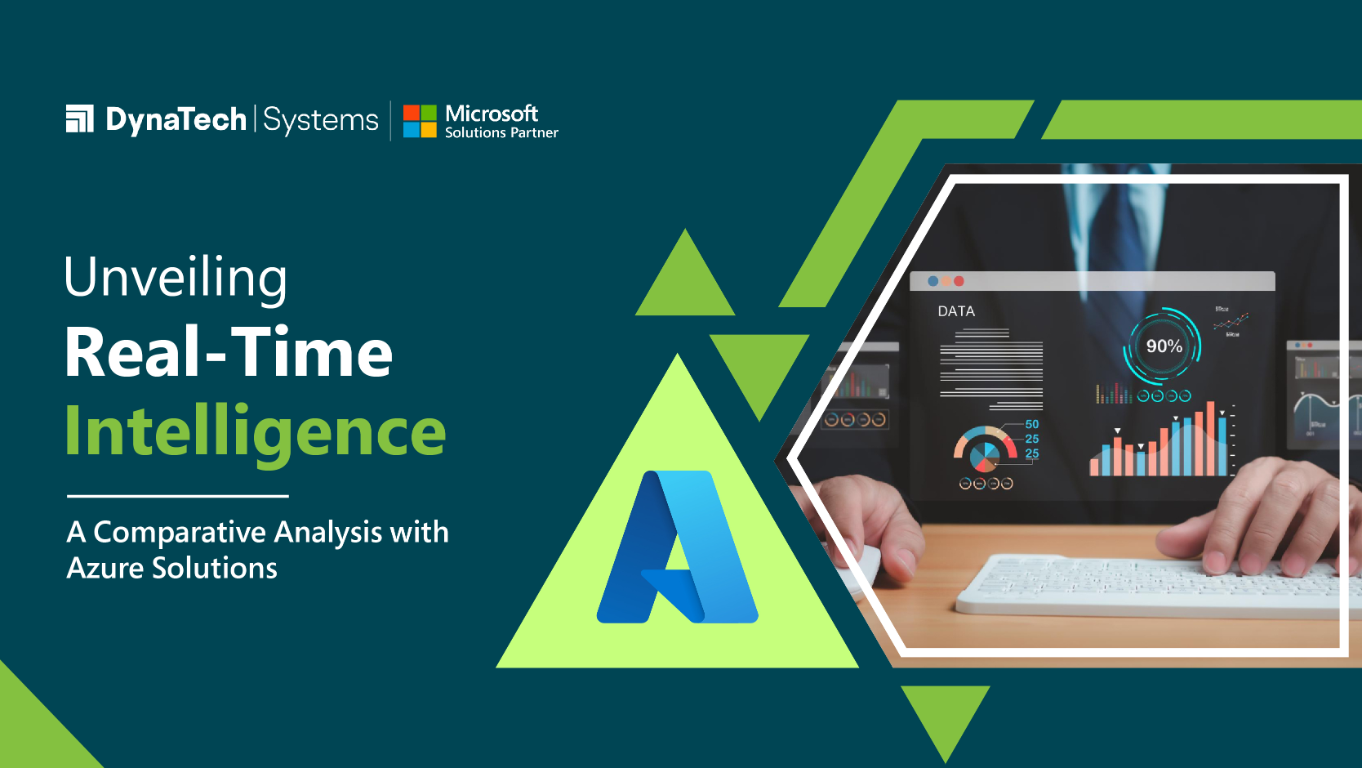In the smooth swift towards digital transformation, enterprises manage heaps of data coming from various sources. With the proliferation of data sources generating intricate signals, time-sensitive data points, and events, the need for robust solutions to ingest, process, analyze, and act upon this data in real-time has become imperative.
This data can be encountered from different sources like,
- Sensor data from assets such as towers, vehicles, plants, IoT Edge Devices, etc.
- CDC (Change Data Capture) streaming from databases powering customer-facing web and mobile apps
- Logs from cloud and on-premises infrastructure and apps
In this pursuit, Microsoft Azure offers a suite of solutions, including Real-Time Intelligence, designed to address the evolving needs of modern enterprises.
Azure Solutions VS Real-Time Intelligence: Key Differentiators
Azure Reporting
Azure offers various services for generating reports and dashboards based on historical data. These include:
- Azure Analysis Services: Create multidimensional data models for complex data analysis.
- Power BI: Cloud-based business intelligence (BI) service for creating interactive reports and visualizations.
- Azure Data Factory: Orchestrate and automate data movement and transformation workflows.
While Azure reporting solutions are powerful, they have limitations when dealing with real-time data:
- Latency: Reports are generated based on historical data, potentially leading to delays in insights and decision-making.
- Limited Actionability: Traditional reports are static and don't offer real-time alerts or triggers for automated actions.
- Scalability Challenges: Scaling up traditional reporting infrastructure to handle large volumes of real-time data can be costly and complex.
Real-Time Intelligence Reporting overcomes these limitations by offering:
- Low Latency: Insights are generated based on current data, enabling faster and more agile decision-making.
- Actionable Insights: RTI solutions can trigger automated actions based on real-time events, improving operational efficiency.
- Scalability: Designed to handle large volumes of streaming data, making them suitable for big data analytics.
Azure Solutions for Real-Time Data Processing
Azure provides a range of Managed Azure Services for real-time data processing, including Azure Event Hubs, Azure Synapse Analytics, and Azure Data Explorer, among others. These solutions empower developers to build architectures that capture, process, and analyze data streams efficiently.
- Azure Event Hubs: A scalable event ingestion service that can manage millions of events per second.
- Azure Event Grid: A fully managed event-routing service that can simplify event-driven architectures.
- Azure Data Explorer: A fast and highly scalable data analytics service for real-time data exploration and visualization.
Other products like Apache Kafka, Amazon Kinesis, IBM Message Queues, and Google Pub/Sub are also used in building real-time data streaming architectures.
Azure API Management (APIM) provides an additional layer of control and security when it comes to accessing and disseminating real-time data generated by your RTI solution. By integrating Azure API Management with your RTI solution, you can ensure secure and controlled access to real-time data, empowering developers and applications to leverage its potential for various business purposes.
What is Real-Time Intelligence?
Real-Time Intelligence, integrated within Microsoft Fabric, offers a paradigm shift in how organizations approach real-time analytics. By providing a comprehensive SaaS offering, the Real-Time Intelligence platform simplifies the process of ingesting, processing, querying, analyzing, visualizing, monitoring, alerting, and acting upon time-sensitive data.
- Real-Time Analytics: Provides no-code, self-service experiences for data exploration and visualization.
- Data Activator: Enables data ingestion and processing.
- Power BI: Enable users to build interactive dashboards and reports.
Internally, it builds on top of the proven scale and reliability of Microsoft Azure streaming and big data platforms, such as Azure Event Hubs, Azure Stream Analytics, and Azure Data Explorer.
Let's delve deeper into the key differentiators between Azure solutions and Real-Time Intelligence:
1. Integration of Services
- Azure PaaS-based solutions require meticulous integration between various services, whereas Real-Time Intelligence offers one-click integration at each stage of the data lifecycle.
- While Azure solutions cater more towards professional developers, Real-Time Intelligence accommodates pro developers, citizen developers, and business users, fostering collaboration and innovation.
|
Capability |
Azure PaaS-based solution |
Real-Time Intelligence solution |
|
Integration of services |
Depends on integration compatibility between the services in scope of the architecture. |
One-click integration at each step of data ingestion, process, analyze, visualize, and act. |
|
Pro and citizen dev experience |
More suitable for pro developers. |
Pro developers, citizen developers, and business users can coexist. |
|
Low-code/No-code |
Only available for transformation in Azure Stream Analytics and for creating alerts using Logics Apps or Power Automate. Pro development required for end-to-end implementation. |
End-to-end implementation from ingestion to analyze to transform to visualize and act can be realized. |
2. Ingest and Process
- Azure PaaS-based solutions offer support for multicloud connectors and CDC streams but may require additional services for comprehensive functionality.
- Real-Time Intelligence provides native integration for various data sources, simplifying ingestion and processing.
Real-Time Intelligence offers end-to-end implementation capabilities, from ingestion to visualization, without the need for extensive development efforts.
|
Capability |
Azure PaaS-based solution |
Real-time Intelligence solution |
|
Multicloud connectors |
Azure Stream Analytics connects to Confluent Kafka. No connectors to read data from Amazon Kinesis or Google Pub/Sub. |
Native integration for Confluent Kafka, Amazon Kinesis, Google Pub/Sub. |
|
Support for CDC streams |
Requires deployment of other services such as Debezium. |
Native integration for Azure Cosmos DB, Postgresql, and Azure SQL. |
|
Support for protocols |
Azure Event Hubs, AMQP, Kafka, and MQTT. |
Azure Event Hubs, AMQP, Kafka. |
3. Analyze & Transform
- Real-Time Intelligence introduces features such as data profiling, visual data exploration, and built-in ML models, empowering users to derive actionable insights from streaming data effortlessly.
- With native integration with Power BI and Real-Time Dashboard, Real-Time Intelligence streamlines visualization and enhances decision-making capabilities.
|
Capability |
Azure PaaS-based solution |
Real-time Intelligence solution |
|
Data profiling |
Not available |
Data profiling view of your real-time tables |
|
Visual data exploration |
Not available |
Drag-and-drop features to visually analyze your real-time data. |
|
Anomaly detection and forecasting models with Built-in ML models |
Available, but need pro development for advanced capabilities |
Available |
|
Visualization (Microsoft) |
Power BI, Azure Data Explorer dashboards |
Native one-click integration with Power BI and Real-Time Dashboard |
|
Visualization (Third party) |
Grafana, Kibana, Matlab. |
Grafana, Kibana, Matlab can also be integrated with Eventhouse. |
4. Act
- Real-Time Intelligence enables proactive decision-making through reactive system events and real-time semantic models, facilitating seamless integration with business processes.
- Unlike Azure PaaS-based solutions, Real-Time Intelligence offers built-in AI capabilities and a wide range of notification destinations, including Microsoft Teams and Outlook.
|
Capability |
Azure PaaS-based solution |
Real-time Intelligence solution |
|
Driving business actions from insights |
Requires Azure Logic Apps or Power Automate or Azure Functions, Azure Monitor alerts. |
Available in Fabric using Reflex items in Data Activator with integration with Power BI Semantic Models, Event stream, and KQL queries. |
|
Reactive system events |
Not available |
Built-in events published through Real-Time Hub |
|
Real-time Semantic Models |
Not available or code-first solution using Logic Apps or Azure Functions |
Not available |
|
Built-in AI |
Not available |
Not available |
|
Notification destinations |
Depends on the connector portfolio of the service. |
Microsoft Teams, Microsoft Outlook, and Power Automate connectors. |
Conclusion
In conclusion, Real-Time Intelligence emerges as a transformative solution for organizations who want to unlock the full potential of real-time data analytics. By offering a unified platform for data ingestion, processing, analysis, and action, Real-Time Intelligence empowers organizations to derive valuable insights, enhance operational efficiency, and drive innovation in today's fast-paced digital landscape. As organizations adapt to new advanced solutions, embracing Real-Time Intelligence will undoubtedly play a pivotal role in shaping their success.
Harness the Power of Real-Time Intelligence Now! Connect With Our Experts Today!




























